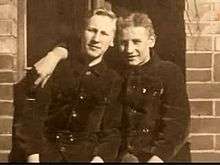Heinz Heydrich
| Heinz Heydrich | |
|---|---|
 Reinhard Heydrich (left) and Heinz Heydrich | |
| Birth name | Heinz Siegfried Heydrich |
| Born |
September 29, 1905 Halle an der Saale |
| Died |
November 19, 1944 (aged 39) East Prussia |
| Allegiance |
|
| Service/branch | SS |
| Rank | Obersturmführer |
| Commands held | editor of Die Panzerfaust |
| Battles/wars | World War II |
| Spouse(s) | Trude Heydrich (née Werther) |
| Relations |
|
Heinz Siegfried Heydrich (29 September 1905 – 19 November 1944) was the son of Richard Bruno Heydrich and the younger brother of SS General Reinhard Heydrich. After the death of his brother, Heinz Heydrich helped Jews escape the Holocaust.[1]
Youth
Heinz Heydrich was born in Halle an der Saale to composer Richard Bruno Heydrich and his wife Elisabeth Anna Maria Amalia Krantz. Her father was Eugen Krantz, director of the Dresden Royal Conservatory.[2] The Heydrich family were well-to-do Catholics. The father, Richard Bruno Heydrich, was an opera singer, the founder of a music conservatory in Halle, and a German Nationalist who instilled patriotic ideas in the minds of his three children.[3] The Heydrich household was very strict and the children were frequently disciplined. As a youth, Heydrich engaged his older brother, Reinhard Heydrich, in mock fencing duels.
Career in the SS
Heinz Heydrich was an Obersturmführer (lieutenant), journalist and publisher of the soldiers' newspaper, Die Panzerfaust. He was at first a fervent admirer of Hitler. But before Reinhard Heydrich’s State funeral in Berlin in June 1942, Heinz Heydrich had been given a large packet containing his brother’s files, released from his strongbox at Gestapo Headquarters, 8 Prinz-Albrecht-Strasse, Berlin. Heinz had shut himself away in his room with the papers. Next morning his wife noticed that her husband had sat up all night burning the documents from the package. Heinz, on leave from the front, could not be engaged in conversation, his wife remembered; he seemed to be elsewhere mentally, and like stone. The files in the package were probably Reinhard Heydrich’s personal files, from which Heinz Heydrich understood for the first time in all its enormity the systematic extermination of the Jews, the so-called Final Solution.[4] Thereafter, Heinz Heydrich helped many Jews escape by forging identity documents and printing them on Die Panzerfaust presses.
Suicide
When in November 1944 an economic commission headed by a State Attorney investigated the editorial staff of Panzerfaust, Heinz Heydrich thought he had been discovered and shot himself in order to protect his family from the Gestapo. In reality, the attorney knew nothing about the forgeries, and was only trying to find out the reason for shortages in paper supplies.[5] Heinz Heydrich is buried in the Soldatenfriedhof (soldiers cemetery) Riesenburg, according to the Deutsche Dienststelle (WASt).
Family
Heinz Heydrich had five children. His oldest, Peter Thomas Heydrich (1931–2003), was a well-known German cabaret singer, and wrote a book about his childhood, father, and uncle. In the book, Peter Heydrich describes how, as a youth, he enjoyed the fame of being a “crown prince,” the nephew of Reinhard Heydrich. During boyhood, he thought of his uncle as a successful sportsman and a sensitive musician. In Prague, Peter observed that his uncle had become a “high animal.” Peter derived many privileges from being Reinhard Heydrich’s nephew. Even after the war, Peter still felt some pride in the familial relationship, if not so openly. But finally, Peter Heydrich had to admit that Reinhard Heydrich was a protean schemer, who planned and executed the Holocaust and other crimes.[6]
See also
References
- ↑ Lehrer, Steven Wannsee House and the Holocaust. McFarland. Jefferson, North Carolina 2000 pp 53-87
- ↑ "Das Spiel ist Aus — Arthur Nebe". DER SPIEGEL 6/1950 vom 09.02.1950, page 21 (in German). Der Spiegel. Retrieved 2009-01-26.
- ↑ https://www.jewishvirtuallibrary.org/jsource/Holocaust/Heydrich.html
- ↑ Callum MacDonald. The killing of Reinhard Heydrich: the SS "Butcher of Prague. Da Capo Press (August 21, 1998). p. 5
- ↑ Dederichs, Mario R. (2006). Heydrich: the face of evil. Translated by Geoffrey Brooks. Greenhill Books, p. 166. ISBN 1-85367-686-1
- ↑ Peter Thomas Heydrich, et al. Ich war der Kronprinz von Heydrich: eine Kindheit im Schatten des Henkers von Prag. Kreuz Verlag, Stuttgart, 2006